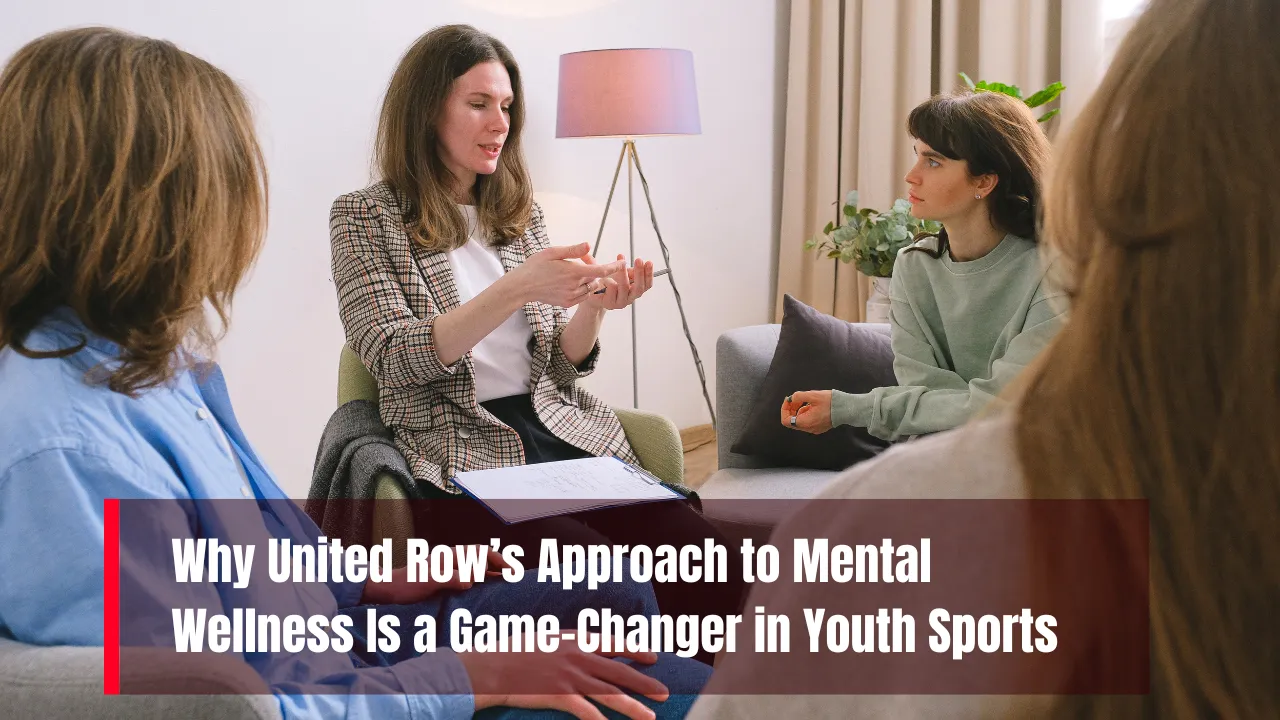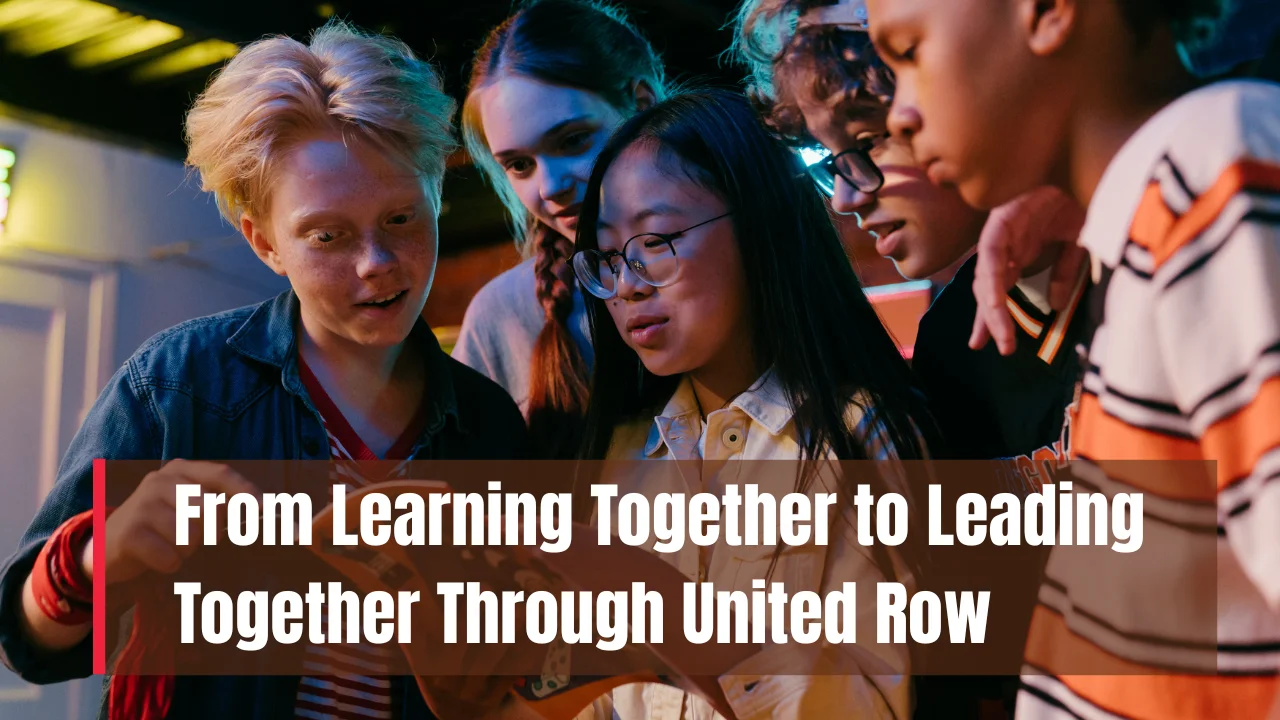Mental Wellness in Youth Sports: Mental wellness in youth sports has emerged as a powerful factor influencing not only performance but also the long-term well-being of young athletes. While traditional youth sports programs often focus on winning, fitness, and skill-building, they sometimes overlook the mental and emotional development of the athletes themselves. This missing piece has created a gap in how young players cope with pressure, failure, and performance expectations.
United Row recognized this critical issue and designed a unique model to bridge it. Their approach blends psychological support, emotional intelligence training, and mindful coaching to foster a healthier athletic experience. This article explores how United Row is leading a quiet revolution in youth athletics, putting mental wellness in youth sports front and center to create strong, confident, and emotionally grounded athletes.
The Power of Mental Wellness in Youth Sports
Mental wellness in youth sports is about more than helping kids cope—it’s about empowering them. United Row’s strategy recognizes that emotional strength is just as important as physical ability. By building mental wellness into every layer of training, from coaching methods to parental involvement, they are creating a model that supports the whole athlete. The result? Reduced performance anxiety, fewer dropouts, stronger team bonds, and happier players who stay committed for the long run. This section breaks down how their emphasis on psychological health is reshaping youth sports culture and athlete development across the board.
| Aspect | United Row’s Mental Wellness Focus |
| Emotional Intelligence | Teaches athletes to understand and express feelings |
| Coaching Training | Equips coaches with mental health awareness |
| Athlete Development | Builds confidence, reduces anxiety, and boosts performance |
| Support Systems | Involves families and mental health experts |
| Team Culture | Promotes inclusivity, empathy, and open communication |
Prioritizing Mental Wellness from Day One
One of United Row’s core principles is that mental training shouldn’t come as a reaction to problems—it should be proactive and embedded in the daily routine of youth athletes. Their programs begin with self-awareness tools that help kids reflect on their thoughts and emotions. Athletes learn how to process frustration, pressure, and competition without bottling it up or burning out.
By normalizing conversations around emotions from the start, United Row creates an environment where athletes feel safe to be themselves. This early introduction to mental health builds emotional resilience, which becomes a lifelong asset not just in sports, but also in school, relationships, and future careers. It’s a modern, human-centered take on youth athlete development that acknowledges mental health as a foundation, not a luxury.
Emotional Intelligence Training for Young Athletes
United Row incorporates emotional intelligence into every level of its youth training programs. Athletes are taught to label their emotions, understand the triggers behind them, and respond constructively. Instead of yelling after a mistake or shutting down under pressure, players learn to reset and refocus using grounding techniques and self-talk strategies.
This focus on emotional intelligence also strengthens team culture. Players develop empathy for their teammates, communicate better on and off the field, and grow into natural leaders. Whether it’s celebrating wins or learning from losses, emotional intelligence supports a balanced mindset that reduces burnout and enhances overall performance.
Coaching Staff Trained in Mental Health Awareness
The role of the coach has evolved—and United Row is leading the way. Their coaching staff receives extensive training in recognizing mental health red flags such as performance anxiety, withdrawal, or mood swings. More importantly, they’re taught how to respond with compassion rather than criticism.
These coaches act more like mentors than traditional authority figures. They use supportive language, create open lines of communication, and focus on progress over perfection. This kind of sports mentorship doesn’t just help athletes thrive—it builds trust, respect, and lasting motivation.
When a coach understands what a child is going through mentally, they can guide them more effectively, both in skills development and personal growth. This blend of technical coaching and emotional support is what sets United Row apart in the world of youth coaching.
Support Systems That Go Beyond the Game
One of the biggest gaps in traditional sports programs is that support often ends when practice does. United Row takes a more holistic approach by involving families, school staff, and mental health professionals in the athlete’s journey. Parents are educated on how to recognize signs of mental distress and encouraged to reinforce positive mental habits at home.
Mental health experts are also part of the framework. They’re available to offer guidance when athletes face difficult situations, such as injury recovery, poor performance, or personal struggles. By building a complete support ecosystem, United Row ensures that no athlete has to navigate tough times alone.
This system prevents athlete burnout, strengthens home-sport balance, and reduces the stigma often associated with mental health in sports.
Real-Life Results That Speak Volumes
The impact of United Row’s mental wellness model is not theoretical—it’s backed by real results. Players report feeling more motivated and confident. Coaches notice improved focus and communication on teams. Parents observe better behavior and emotional control at home.
Perhaps most notably, retention rates have improved. Kids who may have once dropped out due to pressure or performance anxiety are now staying involved, finding joy in the game again. United Row has shown that prioritizing mental wellness in youth sports leads to stronger athletes and even stronger individuals.
Benefits of United Row’s Mental Wellness Approach
- Stronger Athlete-Coach Relationships: Trust builds naturally when mental health is a shared priority.
- Improved Performance Under Pressure: Athletes stay calm, focused, and engaged in high-stakes moments.
- Higher Retention in Sports: Fewer dropouts due to anxiety, frustration, or loss of motivation.
- Boosted Confidence and Self-Esteem: Athletes value their identity beyond wins and stats.
How United Row Stands Out
- Early Intervention Tools: Programs include emotional health modules starting as early as age six.
- Custom Wellness Plans: Mental strategies are tailored to each athlete’s needs and age group.
- Inclusive Environment: Every player receives equal mental and emotional support, regardless of skill level.
FAQs
1. What makes United Row different from other youth sports programs?
United Row focuses not just on physical performance but also on mental and emotional health, offering a complete approach to athlete development.
2. Can mental training really improve athletic performance?
Yes, athletes who manage their emotions and stress well tend to perform better under pressure and recover faster from setbacks.
3. How does United Row train its coaches in mental wellness?
Coaches receive specific training in emotional intelligence, youth psychology, and how to recognize signs of stress or anxiety.
4. Is mental wellness important for younger athletes too?
Absolutely. Teaching mental wellness early builds emotional resilience, which benefits children far beyond sports.
5. Do parents play a role in United Row’s mental wellness system?
Yes, parents are actively included through workshops and guidance so they can support their children’s mental development at home.
Conclusion
United Row is not just changing how kids train—it’s changing how they grow. By making mental wellness in youth sports a central pillar of their philosophy, they’re giving young athletes the tools to thrive both on and off the field. From emotional intelligence training to full-circle support systems, United Row has built a blueprint that puts people first. In a competitive world, they remind us that strength starts within. If you care about the future of youth sports, this is the kind of program worth following.
Share your thoughts below or explore more resources on youth development and sports psychology. Let’s raise a generation of athletes who are not just skilled—but balanced, healthy, and confident.












